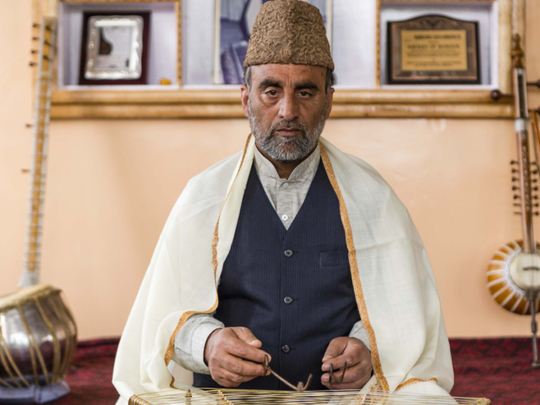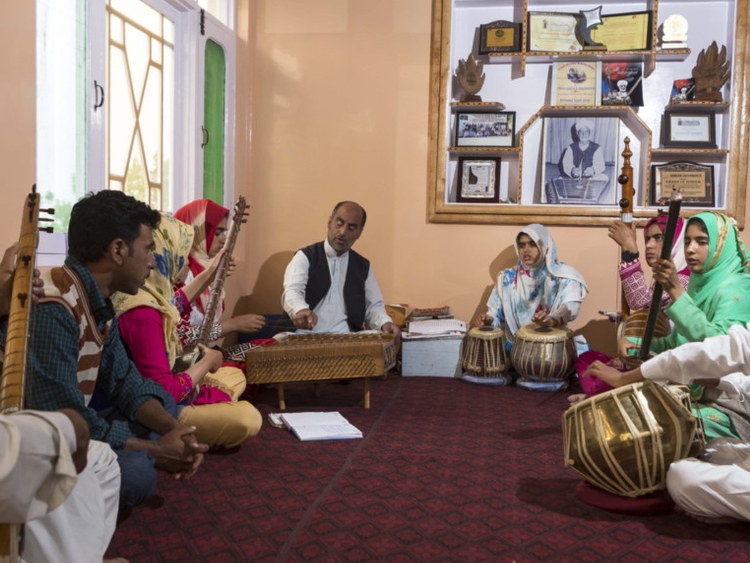
Every Sunday, a dozen or so students assemble in a big hall on the outskirts of Srinagar, the capital city of Indian Administered Kashmir, to learn what many believe is as the most difficult form of music in the state. At a time when Bollywood, western music and the modern version of Kashmiri music is popular among youth, these students, together with their master, are trying to keep alive an unlikely tradition that dates back 500 years.
Sufiyana Mausiqi, as the classical music form is called is not for your average person – it takes between eight and nine years to master, depending on the calibre of any given student. The master, Ustad Mohammad Yaqub Shaikh, is 57 and has been performing and teaching for five decades years now. He knows well the challenge ahead for the music and the students.
“Thirty of forty years ago, one could easily find the mehfils (functions) of Sufiyana Mausiqi everywhere from shrines to elite private gatherings. It gave the spiritual experience to listeners,” Yaqub says. “But now, 90 per cent of such mehfils are gone. People seem to have lost interest, and new artists are hard to get by.”
It is said that the music came from Iran and Central Asia to Kashmir in 15th century. In Kashmir, it was further improvised until it reached its current form. Depending on the date, time, place and situation, the singers usually sing the Kashmiri or Persian lyrics of poets like Nyaam Saheb, Had Zarger and Rumi, Jami, Shirazi respectively. Together, with deep meaningful lyrics and trance-like music, art lovers can listen to it for hours. For some, it is spiritual food that one can only experience and not explain.
Yaqub was just six-years’ old when he started practising on various instruments of Sufiyana Mausiqi, primarily being influenced by his maternal grandfather and legendary grandmaster, Ghulam Mohammad Qaleenbaaf. The road wasn’t easy for him as it was only when he was 15 that he was initiated formally as a pupil into the Cultural Academy of Kashmir. But his commitment never waned, and today he is the most acclaimed Sufiyana Mausiqi artist in Kashmir. At the state’s institutional platforms, he is listed as an A-graded artist.
After mastering the music, Yaqub realised that it was fast losing it place in Kashmir – and if the situation remained as such, it would soon be extinct. Beginning in the early 1990s, Yaqub started to give free tuition to anyone who wanted to learn. The response was cold, but one thing Yaqub knows is never to quit. In 1996, he opened the Qalinbaaf Memorial Sufiyana Music Institute (QMSMI) for his grandfather. It was the start of another struggle as for years he had just a single student.
“Those days were really hard,” he says. “It was the era of violence, curfews and killings. I would be visited by militants and security forces alike, demanding to know what I was doing. But after seeing my work they would leave me alone.
After a new wave of conservative Islam began to spread in Kashmir, music became an easy target. Hard to differentiate between popular music and Sufiyana music, Yaqub struggled to explain that his type of music didn’t hurt religious feelings, and that its lyrics praise the oneness of God and other Islamic teachings.
Eventually, his dedication and struggle paid off and the students began to trickle in. Five years after establishing the institute, Yaqub received the first female student, and later a few more came visiting through word of mouth.
At the institute, as the students take their position, siblings Irfana 17 and Rehana 15 delicately adjust their instruments. They have been coming to classes for the last four years and some of the brightest students. In a society where singing by girls is usually looked down upon, the sisters were lucky to have a music-loving father who supported them in their passion.
“I developed a keen interest in learning Sufiyana Music after hearing it from my father and Ustad Yaqub. After I came to know that Yaqub teaches girls too, I asked my father to let me learn it too. He agreed,” says Irfana.
The girls face challenges for daring to learn the music – and dozens of girls had to leave midway after coming under pressure from their conservative families. Others too leave after marriage and there are no avenues nor government support to make a career out of music.
Shabnam Bashir was one of the first girls to have completed her degree at the institute. She had literally fought with her parents to pursue her passion of Sufiyana music. She always stood out among her peers at the institute with her talent and she performed at Doordarshan TV, Radio Kashmir and at many events. Rashida Akhtar was another product of the institute. She became the first ever woman tabla player in Suriyana music from Kashmir.
Despite their skills, their preferred music offers little opportunities for scholarships, awards or singing contracts, and most artists reluctantly leave the profession.
“On one side society is not allowing them and on the other hand government has simply choked their avenues,” said Yaqub. “I sometimes feel frustrated. I pour in almost a decade to train them and then our social set up kills their talent.”
Up to now, Yaqub has taught around 45 girls but only five or six are continuing to practice and perform. “The rest of them have abandoned the field as they feel it has no future, no matter how passionate one is,” he says. “People used to derive spiritual peace from the Sufiyana Mausiqi of music.”
Over the past five centuries, the music has been propagated orally – something of a bane too.
“Of the total 180 maqams (mode), only around 40 maqams remain today,” says Yacub, who has documented the remaining maqams in a book.
Some students who have mastered the art of Sufiyana Mausiqi now work as part-time artists. Yousuf, in his late 40s, is passionate about it and has learnt from the master for the last seven years. Unable to find takers for his art, he works as a mason and, whenever he gets a chance, performs too. Yaqub often brings Yousuf and other students for performances to encourage them. One bright musician is working as a plumber, another as teacher in a private school – all to make ends meet.
Despite the challenges, there is a hope. From the low in the late 1990s, the interest in the form of music has increased. “Earlier, I used to admit everybody. Now I select a candidate, be it girl or boy, based on the level of interest, talent and other factors,” he says.
Yaqub doesn’t charge students for using his instruments, and they learn to play instruments the sitar, santoor, Kashmiri sitar, tabla and saaz-e-Kashmir in addition to vocal lessons.
“The younger the student, the better it is,” he says. “A student of eight will be ready by the time he or she reaches 16.
And for the future?
“I don’t know for how much time I will keep this tradition alive but until my energy permits, I am not going to quit,” he says. “In the current world people are stressed and often directionless. There is no peace and Sufiyana music is one thing that helps them reconnect with their inner self. Someday, people will realise its importance and it will flourish too.”
Haroon Mirani is a writer based in Srinagar, India.













